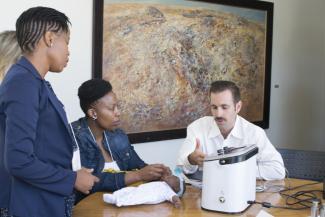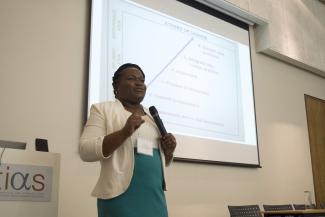“Any problem can be solved with a little ingenuity” – Dr Elizabeth Molyneyx, University of Malawi College of Medicine

In November of 2019, 100 researchers, clinicians, policy-makers, and educators gathered at the Stellenbosch Institute for Advanced Studies in South Africa for a 3-day conference to discuss innovations for improving maternal, newborn and child health (MNCH) in sub-Saharan Africa. Organized by the Centre for International Child Health (CICH) at BC Children’s Hospital and Action on Sepsis Research Cluster at the University of British Columbia (UBC), attendees represented 62 organizations from 18 countries and brought together diverse perspectives and expertise to a global challenge.
Globally, 5.6 million children die before they reach their fifth birthday, many in the first month of life, and 300,000 women are estimated to die from complications during pregnancy and childbirth each year. For mothers, newborns, and children in low-resource settings, sepsis is a leading cause of death, arising from infections which can occur at any point in an individual’s lifespan. Innovations have an enormous potential to save maternal, newborn and child lives, but can only do so when implemented successfully. Throughout the conference, attendees such as Dr David Goldfarb (BC Children’s Hospital) shared their experiences implementing new technologies in resource-limited settings. As part of the Innovating for Maternal and Child Health in Africa (IMCHA) initiative, Dr Goldfarb is working with researchers and healthcare providers in Malawi to understand the barriers and facilitators to implementing evidence-based technologies for improving newborn health in rural hospitals. From their stories, the importance of local champions, local cultural contexts, and long-term manufacturing and marketing plans became clear.

During the conference, idea pitches provided innovators a chance to gain feedback and build connections to help move their ideas forward. To help health care workers identify newborns suffering from sepsis, Dr Pascal Lavoie and Dr Guy Dumont (BC Children’s Hospital) have created VideoOx, a smartphone app that synchronizes video imaging with vital sign monitoring.
The final day of Impact Now focused specifically on the emerging challenges of sepsis and the increasing threat of antibiotic resistance. As Dr Pui-Ying Iroh Tam (Malawi-Liverpool Wellcome Trust Clinical Research Programme) noted, antimicrobial resistance is rapidly outpacing the development of new antibiotics. This makes proper management of antibiotics “as important as global warming”. Dr Ellen Chirwa (Kamuza College of Nursing) also gave an eye-opening talk on maternal sepsis, as she recounted how patients in Malawi were asked to buy brown sugar, vinegar, and hydrogen peroxide because of a lack of wound dressing supplies on the ward.
Accurate data can be extremely useful for health care workers managing care for sepsis patients. However, obtaining high-quality data has been challenging in resource-limited settings. To address this challenge, the Pediatric Sepsis Data CoLaboratory was launched in 2017. This international network aims to improve the quality of care for children with sepsis by creating a platform for collecting and sharing standardized, open data. To close the conference, Dr Mark Ansermino (CICH) and Dr Niranjan ‘Tex’ Kissoon (BC Children’s Hospital) shared the progress the CoLab has made since its initial launch.
Thank you to everyone who attended Impact Now! This amazing event would also not be possible without the help of our sponsors: CICH, the Peter Walls Institute for Advanced Studies at the University of British Columbia, and the Innovating for Maternal and Child Health in Africa (IMCHA) initiative.
By Stefanie Novakowski (Grant Writer, CICH and Action on Sepsis) and Maggie Woo-Kinshella (PRE-EMPT Global Health Research Coordinator and PhD Student with Dr R Elango, Dep’t of Obstetrics and Gynaecology)
